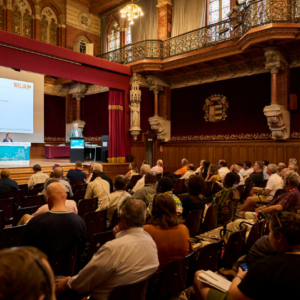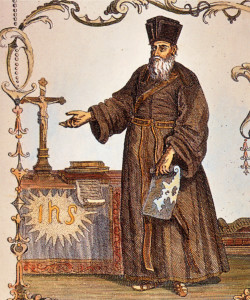15/11/2022
Our experience in the congress of Wuja in Barcelona

A testimony about the Barcelona Congress by a group of Portuguese alumni
Earlier this year, the Association presented the Youth Wing with a rather irresistible proposal. A trip to Barcelona, on behalf of our Association, in order to meet more people from Jesuit schools and universities around the world, share the reality of our association, and understand how other associations work in the rest of the world. Naturally, our answer was “Yes”. We started to take care of all the logistics, flights, bags, registrations, everything! The 12th of July would be the day of departure from Portugal.
Whenever we throw ourselves headlong into something, we create expectations, in the end, we are faced with reality. In view of this, we decided that this text would deal with this, a comparison between these two dimensions, in order to understand, together with the former students who read this text, whether our participation in the WUJA exceeded expectations or not.
The WUJA allowed us to experience three dimensions that we consider to be the three main objectives of this conference: the social (networking), professional (lectures and workshops) and recreational (activities) dimensions.
Regarding the social dimension, we expected to find an older community, as the general idea of alumni associations is that it is a community more frequented by people old enough to be our parents or grandparents (considering that we are twenty-something years old). In addition, we did not expect to find a wide variety of nationalities, we expected to find a mostly European community and some others from different continents.
Our motivation was to meet as many people as possible, whatever their age or country. When we arrived, we realized that we were both right and wrong. Wrong because the number of Youth Alumni was very high, about 70 former youth ward students from all over the world. We felt an enormous spirit of dedication, desire to make it happen, and something that marked us a lot was the baggage that each person brought with them, the stories, contexts, conversations, and the variety of nationalities we encountered, from Indonesians to Americans, Indians, Congolese, and many other nationalities. All this overwhelmingly exceeded our expectations.
Right, because the older community was spectacularly well represented, very open to dialogue and sharing their experiences, which helped to exceed expectations at this level.
Expectations regarding the lectures were low, we thought they would be interesting, though they wouldn’t tell us anything new. We were, however, curious to see how the real-time translation would work. Regarding the workshops, the idea we went there with was that we would be divided into small groups (4/5 people) and that we would develop a topic and present solutions.
The reality experienced in the professional dimension was better than expected, that is, the topics of the lectures were very well chosen and the speakers captivating. We noticed, however, that many members of the Youth community, despite finding the topics relevant, did not find them entirely interesting for our ages. An example of this is the fact that there are few youths who have already had contact with the professional world, or who have already developed larger projects, with this, certain lectures despite having allowed the clarification of certain doubts within this theme, were not fully elucidative, as there was little contact with this same reality.
Regarding real-time translation, in a very simplified way. The speakers during his lecture spoke the language that suited them the most, the listeners chose to listen to the original language or request headphones that translated what was being said in real time to the headphones. This huge advance in technology surprised us and is an extremely strong point of WUJA, as there were some participants who would have some difficulty in following not only conversations, but also lectures.
Furthermore, and leaving the advice to our friends in Indonesia, the themes of the youth are not always the same as the Themes for older alumni. Themes about entering the job market for the first time, how to take action in certain situations of poverty, what are young people expected to do. These are some topics that we ended up discussing among ourselves, but that we think are relevant in the context of a lecture.
After attending the lectures, each participant went to the workshop location on the chosen topic (theme that corresponded to one of the lectures heard on the morning of the same day), they indicated a room, where approximately 20 other alumni, who chose the same theme, were. The workshop was led by a congress volunteer and by a spokesperson who presented the topics to be discussed and took note of the conclusions drawn. As previously mentioned, the workshop consisted of solving contemporary issues/problems related to the themes of the lectures (Ex: Ecology, Migration, Technology, Role of women, …), where the 20 people present in the room gave personal opinions and solutions to the problems. This created a favourable environment for brainstorming, solving global problems, networking and socializing.
Finally, about the recreational dimension. Quite honestly, this dimension was the one we were looking forward to the most. We were supposed to go to the beach, do sports, visit Barcelona, see the Sagrada Familia, have dinner together, …
The truth is, the moments of conviviality were those that allowed the creation of bonds with everyone, and our strategy was to meet a lot of people and make not only good contacts, but also good friends, the activities helped in that, provided good conversations, a lot of laughs, competition (healthy, of course) and helped us to understand what needs to be done, we only have to figure out the “how”. On one day, we had a sports tournament, we played basketball, volleyball and football, as soon as the balls started to make their way across the different fields, the spirits were raised, there were no worries, it was just us and a ball, all rowing in the same direction and doing it as a team. Sports were very important in creating a spirit of companionship and teamwork. The same goes for social times, dinners and evening outings. These all allowed the coming together of various pieces of this big puzzle that the Jesuit alumni community has. It is always nice and relaxing to go for a drink with people willing to talk, have a good time and, after some discussion, recognize that Cristiano Ronaldo is the best football player in the world. The visits to the Gothic Quarter and the Sagrada Familia were very exhausting but, once again, allowed for important, deep, funny, captivating conversations, etc.
The question that remains is this: What do we take away from here?
We take away the conversations, we take away the trips to the cañas, we take away new friendships, we take away many contacts, we take away the motivation, enthusiasm, and the will to always do better, to give our MAGIS (the pun was intentional, in 2023 Lisbon will organize MAGIS23).
We also bring along ambition and the courage to do better for our association as well as for WUJA. We bring a great desire to discover and make “it” happen. We are the future of this great worldwide union that is governed by the same principles- the Ignatian principles. Finally, we take with us very high expectations for the next congress, to be held in Indonesia in 2025.
Francisco Seabra – Margarida Farelo -Diogo Sousa
Associação dos Antigos Alunos do Colégio S. João de Brito (Portugal)


